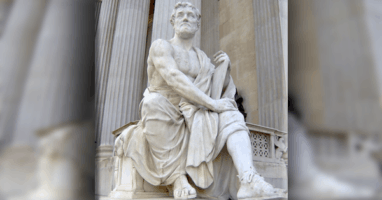
Dr. Stephen Nichols introduces us to Tacitus, a first-century Roman historian and one of the first references to Christ outside of the New Testament
Tacitus, an early Roman historian
Tacitus was born around 56 AD and he died in 118 AD. He was an orator, a lawyer, he served in the Roman Senate and in the province of Germania, and he was a writer. He is known to us as one of the historians of the first century of Rome. Through his books, The Annals and The Histories, he tells the history of first century Rome. He starts with Augustus Caesar in 14 AD, and he ends with Domitian’s death in 96 AD. Through the lens of the emperors, he is able to look at the various events of the first century. This is very important as it coincides with Christ and His earthly life, along with the writing of the New Testament and the early church.
Much of Tacitus’ work is lost, but the parts that remain are fascinating. One of the remaining books is volume fifteen of The Annals, which tells the story of Nero’s reign from 62 AD to 65 AD. This is a very important time as it coincides with Paul’s imprisonment and, as church tradition tells us, it would have been Nero who oversaw the martyrdom of Peter and Paul.
There was a very important event during this time period: the burning of Rome. As Tacitus tells the story, there is the idea that Nero himself was responsible for the fire. He had a desire to rebuild the city and thought that if he could simply burn away some of those undesirable parts, it would be easier for him to rebuild. He likely started the fire which grew out of control and ended up destroying much of the city. This caused the people of the city to turn on Nero.
Tacitus picks up this story there:
“Consequently, to get rid of the report, Nero fastened the guilt and inflicted the most exquisite tortures on a class hated for their abominations called ‘Christians’ by the populace. ‘Christus,’ from whom the name had its origins, suffered the extreme penalty during the reign of Tiberius at the hands of one of our procurators, Pontius Pilate. And a most mischievous superstition thus checked for the moment again broke out, not only in Judea the first source of the evil, but even in Rome.” And here we see what Tacitus thinks about Rome, “and Rome where all things hideous and shameful from every part of the world find their center and become popular.”
“Accordingly,” Tacitus continues, “an arrest was made of all who plead guilty. Then, upon their information, an immense multitude was convicted not so much of the crime of firing the city,” because there was no evidence that the Christians did that, “but as hatred against mankind. Mockery of every sort was added to their deaths. Covered with the skins of beasts they were torn by dogs, or nailed to crosses, or doomed to the flames burnt to serve as nightly illumination when daylight had expired. Nero offered his gardens for the spectacle and was exhibiting a show in the circus while he mingled with the people in the dress of a charioteer or stood aloft on a chariot. Hence, even for criminals who deserved extreme and exemplary punishment, there arose a feeling of compassion for it was not as it seemed for the public good, but to glut one man’s cruelty for whom they were being destroyed.”
We can see a lot in that selection. For one thing, we see one of the first references outside of the New Testament to Christ. There we have Him dated under Pontius Pilate, and there we have a reference to His death. We also see the attitude of the Romans to these Christians and we see the suffering and the persecution, the intense cruel persecution, of these Christians in the first century at the hands of Nero.
That’s Tacitus, an early Roman historian.
Stay connected with 5 Minutes in Church History by getting the weekly podcast on iTunes, SoundCloud, or via RSS. You can also subscribe to the blog via RSS and follow us on Twitter and Facebook.
(This podcast is by Ligonier Ministries. Discovered by Christian Podcast Central and our community — copyright is owned by the publisher, not Christian Podcast Central, and audio is streamed directly from their servers.)